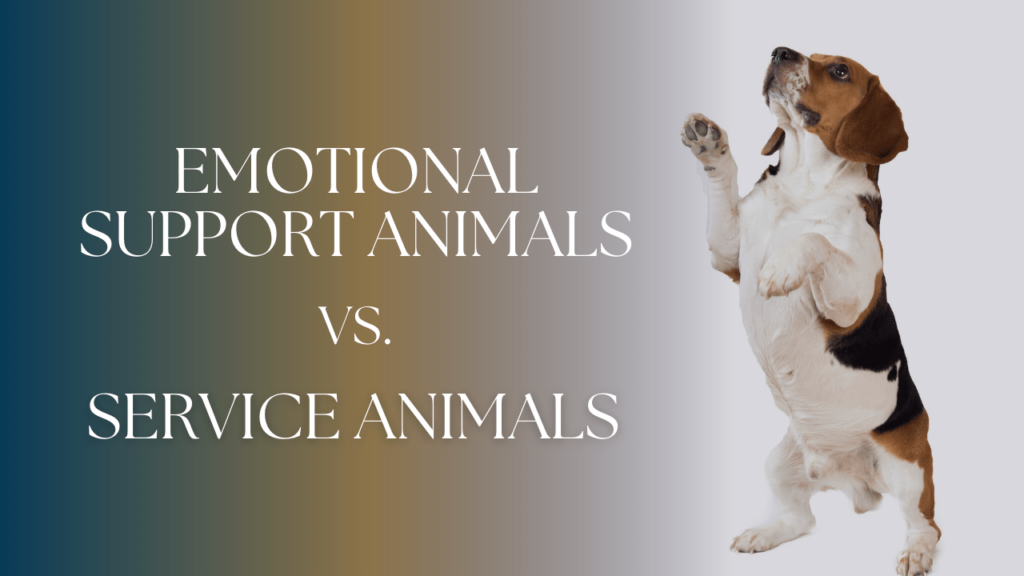
Emotional support animals and service animals are the same, but different.
If you’re renting out a property in Charlotte, you’ll need to understand the nuances of those differences because they impact how you work with those different accommodations within your rental home.
You’ll note we said accommodations.
Whether we’re talking about a service animal or an emotional support animal, we are not talking about pets.
Pets are animals you can choose to allow or not allow in your property. You can say yes or no depending on the pet size, the pet age, or even the breed of dog. You can charge a pet fee or a pet deposit or pet rent. You can establish restrictions and rules and screening standards.
Not so with service animals and support animals. These are accommodations for tenants who have disabilities, and according to the U.S. Census Bureau, more than 42 million people living in the United States have some kind of disability. That means you’ll encounter a tenant who needs a service animal or an emotional support animal if you haven’t rented to someone who needs one already.
Both service animals and companion animals are protected by fair housing laws and the Americans with Disabilities Act (ADA). Let’s talk about what makes them similar and why they’re also so different.
Complying with Fair Housing Laws and the ADA
Service and support animals are discussed in a number of federal, state, and local laws, but everything really starts with the Fair Housing Act (FHA).
Discrimination in rental properties and other housing practices is not permitted on the basis of several protected classes, including disability.
Each request for a service animal and an emotional support animal request must be considered on a case-by-case basis, the same way you would consider any other requests for reasonable accommodation.
Service Animals and Support Animals in Charlotte Rental Homes
Let’s start with some quick definitions and an understanding of how they’re the same.
According to the Americans with Disabilities Act, a service animal is a dog that is individually trained to do work or perform tasks for a person with a disability. An emotional support animal is a companion for a person who needs the emotional support that such an animal can provide.
They’re the same because the law sees them as accommodations. You have to treat these animals the same way you would treat a tenant requesting a wheelchair ramp or grab bars in the shower or a dedicated parking space outside of an apartment building.
You have to allow them, and you cannot treat them as pets.
Service Animals vs. Emotional Support Animals: Differences
We know they’re the same in that they’re protected by two important federal laws and they cannot be treated as pets. But, how are service animals and emotional support animals different?
- Animal Types
One major difference between the two is this: emotional support animals can be anything. They can be dogs or cats or rabbits or hamsters. They can be guinea pigs or snakes. Service animals, however, are almost always dogs. Miniature horses can also qualify as a service animal, but only under very specific circumstances. They can be assigned a task such as pulling a wheelchair, providing stability, and helping people get up after a fall. However, they need a lot of space, so they would not work out in most rental settings.
- Training and Tasks
Service animals have been exclusively trained to do specific work. They have a job, and it’s a job that helps someone with physical, mental, or emotional disabilities. The work or task an animal has been trained to provide is always directly related to the person’s disability. Seeing Eye Dogs will guide people who are blind, for example. A hearing dog will help people who are deaf and especially prone to potential dangers. Some service dogs are trained to protect someone who is having a seizure. People with a mental illness may rely on their service animal to take prescribed medications at specific times. They might serve as a coping mechanism to someone with Post Traumatic Stress Disorder who is having a panic attack.
The duties performed by a service animal will depend on the person and the disability.
Emotional support or companion animals, however, do not get trained in a specific task. Their function is to provide comfort or emotional support to someone with a disability, and while they do not qualify as service animals under federal law, they are still protected. This Fair Housing Act has a broader definition of what qualifies as an “assistance animal,” and emotional support animals are included in that definition. Assistance animals can serve different roles and may be an emotional support animal, companion animal, or therapy animal.
What Can Charlotte Landlords Ask Pertaining to Disability?
 It’s not easy to talk about a person’s disability, so the conversation you have with tenants or applicants might feel uncomfortable. You don’t want to violate fair housing laws by asking about their physical and mental health, and people are entitled to their privacy.
It’s not easy to talk about a person’s disability, so the conversation you have with tenants or applicants might feel uncomfortable. You don’t want to violate fair housing laws by asking about their physical and mental health, and people are entitled to their privacy.
But, you also want to protect your property. You want to avoid being duped by someone who is potentially trying to make a pet look like a service animal.
As long as you are respectful and speaking within the confines of the law, you should feel free to ask a few elemental questions.
Legally, landlords can ask tenants if their service and/or emotional support animal is necessary for them to use and enjoy the housing unit that they’ve applied for or that they’re currently living in. You cannot ask a tenant who needs a service animal for documentation that they need the animal (it’s usually obvious, and service animals are identified as such), but you can ask for documentation from a professional in the medical field when a tenant wants to move in with an emotional support animal.
Questions about what this means for you and your Charlotte rental property? Contact us at AM Realty, and we’ll help you navigate fair housing and service/support animals.
